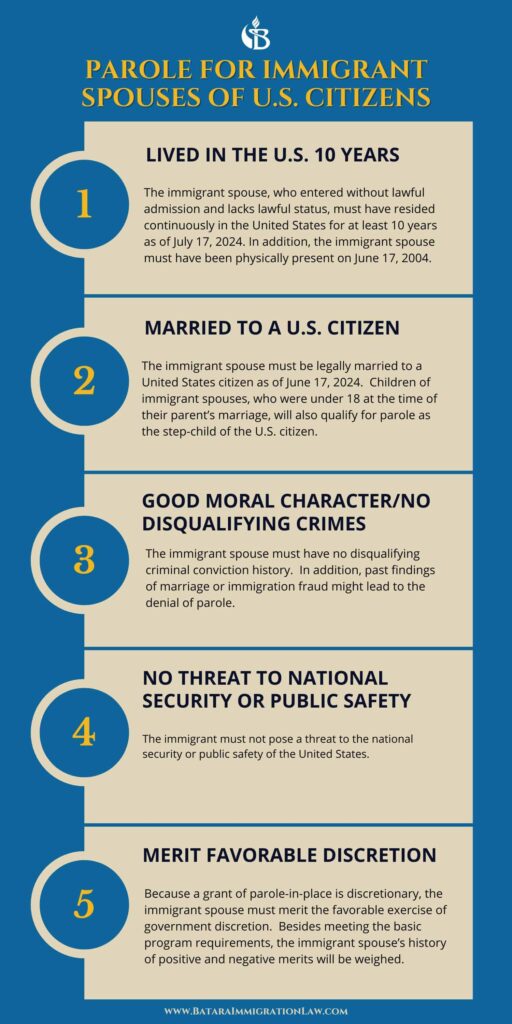
UPDATE: THE BIDEN ADMINISTRATION’S PAROLE IN PLACE PROGRAM FOR SPOUSES OF U.S. CITIZENS STRUCK DOWN BY FEDERAL COURT
On November 7, 2024, the Parole In Place program was struck down by a federal court. Although the Biden Administration may appeal the decision, given the results of the recent presidential election, it is unlikely the program will be reinstated.
This article was written before the court order. It outlines the main issues of the proposed program, which are now moot.
In the author’s view, since many of the parole program’s beneficiaries would have been relatives of Hispanic immigrants living in the United States, it is puzzling why nearly 50% of Latinos who voted supported the Trump campaign.
However, parole may be dead, but at least two options for would-be applicants remain that may still help them one day win permnent residence.
On June 18, 2024, President Biden announced a new program entitled “Process To Promote The Unity And Stability of Families”, for immigrant spouses of U.S. citizens.
The proposal relies on a concept known as Parole-In-Place.
This form of parole enables immigrants, already in the U.S. – who have not been admitted – to remain in the United States. Generally, parole-in-place has been reserved for specific family members of a current or past member of the U.S. military.
With the announcement, the Biden Administration expanded the use of Parole-In-Place to immigrant spouses of U.S. citizens. Those who are approved will receive a three-year work permit, deferral from deportation, and allowed to apply for permanent residency in the U.S.
In this article, I will dive into various details, lingering questions, and tentative answers regarding possible issues.
Table Of Contents
- Entry Without Admission
- Official Requirements Unannounced
- Relevant Evidence: Organization And Presentation
- Residence Of 10 Years In U.S.
- Marriage To U.S. Citizen
- Good Moral Character
- Threat To National Security And Public Safety
- Favorable Discretion
- The I-94 Significance
- Three Year Permanent Residence Application Limit
- Children Of Immigrant Spouses
- What If Your Parole Is Denied?
- Winning Parole Does Not Guarantee Permanent Residence
General Overview
Let’s begin with three preliminary issues that set the parameters of the eventual parole-in-place program details.
1. Entry Without Admission
The immigrant spouse must have entered the United States without admission or parole and not currently have lawful immigrant or nonimmigrant status
To better understand the meaning of parole, it is helpful to contrast it with the concepts of entry and admission.
A person can enter the U.S., and even be living in the U.S., without having been legally admitted.
If a person has made a lawful entry, this means they have been inspected and authorized to come into the country. This is deemed a lawful entry.
Being admitted means the person has made a legal entry.
Parole, on the other hand, allows immigrants to enter or live in the U.S., as if they have been admitted, for a temporary period, even though they have not been admitted.
Thus, immigrants who have entered with a tourist or school visa are not eligible. Parole-in-place is only available to immigrants who have not been legally admitted.
2. Official Requirements Unannounced
The full requirements, along with the government fees and the mandatory applications, are anticipated to become available by this summer.
Without the official Federal Register notice, it is not possible to know exactly who will and who will not qualify for the new parole program.
It goes without question that immigrants will likely have to submit a new application using a form which has not yet been published. The June 18 announcement noted applications should be available by summer.
Applicants will have to provide documentation proving that they meet all requirements and pay a processing fee to the government. It is not yet known what forms of documentation will be accepted and what the fee will be.
3. Relevant Evidence:
Organization And Presentation
When immigrants apply for parole status, they will need to meet all the requirements with relevant evidence.
Not every mixed-status marriage of 10 years or longer will qualify. The road to success in not guaranteed.
The devil, as always, is in the details.

Whereas the marriage evidence should be relatively easy to show, proving the long-term residence will be more difficult. Further, other issues, as outlined below, may require professional assistance and guidance.
When it comes to gathering, organizing, and submitting evidence, there are two main concerns you should pay close attention to.
First, haste makes waste.
It is not uncommon when new programs are set forth, immigrants and their supporters assume an easier path than what is eventually set forth by the government.
It’s a natural inclination.
Having lived in the shadows of American society for over 10 years, on an incessant immigration roller coaster ride, replete with emotional highs and lows, several mixed-status couples are tired of the game.
As a result, many tend to swiftly pounce on the latest presidential sound bites, the hurried proclamations by activists, and cursory opinions of legal assistants and family members. .
The haste is unmerited.
Immigration success is not a race. More often than folks suspect, the tortoise, not the hare, wins the green card.
In other words, do not minimize careful planning and preparation.
Of course, basic evidence will be needed like marriage certificates, birth certificates, tax records, rent, and mortgage receipts. You should also make a list of persons who have known you over the past 10 years, including in-laws, co-workers, friends, and neighbors.
Yet, this is only the beginning or a strong parole application.
Second, beware immigration fraudsters.
Each time the mere hint of a new immigration program arises, unscrupulous con artists spring into action.
These crooks know most defrauded immigrants, being without legal documents, are afraid to contact law enforcement authorities.
Immigrants victimized by fraud lose far more than the money spent.
Many are left to face deportation and removal from the United States. Their loftiest dreams are transformed into legal nightmares.
It’s not just con artists from whom you must inoculate yourself and your family.
Well-meaning relatives, friends, notarios, and even some lawyers may offer to assist you – but your case presents issues over their heads.
Be cautious.
Parole In Place Eligibility Requirements
In this section, I’ll go over five specific parole-in-place requirements and potential stumbling blocks related to those requirements.

4. Residence Of 10 Years In U.S.
The immigrant spouse must have lived in the United States for at least 10 years as of June 17, 2024.
This likely means the immigrant spouse must have lived continuously in the U.S. since June 17, 2014. (Or perhaps June 18, 2014, depending on what the government considers the starting date for the ten years.)
In addition, the immigrant spouse must have been physically present on June 17, 2004.
Some breaks in residence, those which qualify as short and casual absences, will not cut off the period of continuous residence.
A potential problem with some immigrant spouses is that they have violated what is known as the permanent bar.
Here is the risk. If an immigrant unlawfully entered the U.S. 15 years ago, lived here for over a year, then left, maybe even just two weeks. Then he reentered the U.S. He has since lived in the U.S. continuously for 13 years.
Because he lived in the U.S. for over a year without permission, left, and returned tp the U.S. without permission, he is in violation of the permanent bar.
5. Marriage To U.S. Citizen
The immigration spouse must be legally married to a U.S. citizen as of June 17, 2024.
There does not appear to be any duration requirement that the marriage must have been for a specified number of years. Originally, many immigrant advocates thought the Biden proposal might require 5 to 10 years of marriage. However, the rule is merely marriage as of June 17, 2024.
Will common law marriages, which are recognized in common law states, be recognized as “legal marriages” for purposes of the Biden Plan? Or will only traditional marriages with “official” marriage certificates be acceptable?
6. Good Moral Character
As with all immigration programs, a showing of good moral character will be necessary. Some convictions will cause applications to be denied.
The criminal conviction rules are stringent.
- All felony offenses are considered disqualifying.
- Convictions for some offenses are also disqualifying regardless of whether the conviction was a felony or misdemeanor.
- All other criminal convictions, excluding minor traffic offenses, will result in a presumption of ineligibility. To overcome this presumption, immigrant parole applicants will need to prove they warrant a favorable exercise of discretion.
7. National Security, Public Safety, And Border Concerns
Immigrant spouses must not be deemed a threat to national security public safety, or present a border security concern..
This requirement goes far beyond simply having a relationship with terrorist oranizations.
Indicators of public safety concerns include past criminal conduct like former gang membership. Border security concerns include apprehension following entry into the United States without authorization on or after November 1, 2020.
The immigrant spouse must merit a favorable exercise of discretion.
It is likely this will be a “normal” discretionary review, in which the immigrant spouse’s overall positive and negative merits will be weighed, such as:
Positive Factors
- Length of residence in the United States
- Family ties in the United States
- Community ties, involvement, and contributions
- Humanitarian concerns, such as serious medical conditions
Negative Factors
- Criminal convictions and restraining orders
- Failure to pay tax obligations
- Failure to pay child support
- Failure to comply with civil court orders
The Permanent Residence Process
After Parole In Place Is Granted
Winning parole is only half of the equation articulated by President Biden.
After an immigrant’s parole status is achieved, the real goal of immigrants and their U.S. spouses comes clearer into focus: applying for green card status via marriage.
9. The I-94 Significance
Once undocumented spouses are approved for parole, they will receive an I-94. This document makes them eligible for a green card via marriage, and at an interview in the United States.
In general, the I-94 is the Arrival/Departure Record issued to immigrant travelers who are admitted to the United States, and attached to the visitor’s passport. The visitor must
exit the U.S. on or before the departure date stamped on the I-94.
A grant of parole shows lawful admission. This means when an immigrant married to a U.S. citizen seeks permanent residence, the immigrant will be able to attend his or her interview at a local USCIS office.
Here’s the virtue of local interviews.
The immigrant does not have to file an I-601A waiver, prove extreme hardship to their spouse, or travel abroad for an interview in their home country.
However, winning parole does not mean winning permanent residence.
Without knowing the final requirements, there could be some issues that do not harm an immigrant spouse’s chance to win parole-in-place, yet devastate their subsequent green card application.
10. Three Year Permanent Residence Application Limit
Once their parole applications are approved, immigrant spouses will have three years to apply for lawful permanent residence through the parole-in-place program and will be eligible for work authorization during this time.
Based on the current wording, it appears there is no expiration date set at present for the new immigrant spouses parole program.
The three year limit seemingly means that after parole is granted, the immigrant spouse must file their application for permanent residence. This likely means that the I-94 will likely have a three year expiration date.
However, it is not entirely clear if the grant of parole will be limited to a one-time grant. Or if it will it be either a short-term grant, like 12 months, and subject to renewal.
Nonetheless, it seems like the entire immigrant spouse parole-in-law progam may be subject to a three-year window. Once the three years have passed, the program will cease to exist.
(As an aside, the upcoming presidential election will have a major effect on how the parole-in-place program for immigrant spouses develops in the next few years. One candidate, in particular, is apt to kill the program.)
Important Corollary Concerns
For Mixed Status Marriages
Before closing, I’d like to touch on two other aspects of the Biden parole-in-place program for undocumented immigrants.
11. Children Of Immigrant Spouses
Children of immigrant spouses will also be eligible for parole as step-children of U.S. citizens.
Here’s the rule for step-parent/step-children immigration petitions. For a step-parent to petition a step-child, the marriage between the immigrant’s biological parent and the U.S. citizen must have taken place before the step-child turns 18.
That part seems clear.
But what about the parole process for children of the immigrant spouses?
The central question here is whether the immigrant child’s parole application stands alone? Or does the child’s parole status automatically follow that of his or her parent?
The latter approach is the more immigrant-friendly provision.
After all, if the 10-year residence rule applies to step-children, those who were born more recently, like only 5, 6, 7 years ago, would be disqualified.
What about immigrant children born abroad? Because the immigrant parent needs to have continuously resided in the U.S. since June 17, 2014, it might seem any child born abroad was before that date, and thus must be ten years or older.
Yet, consider if an immigrant child was born abroad 13 years ago, but his parent left him behind with grandparents for five or six years. The child will not have accrued ten years in the U.S.
To impose the 10-year residency rule on such children would be cruel. The obvious solution in this scenario is to impute the parent’s continuous residency time in the U.S. to the child, allowing the child to be granted parole-in-place status.
Hopefully, the USCIS final rule will clarify how such situations will be handled.
12. What Happens If Parole Is Denied?
A grant of parole-in-place is discretionary. Denial of applications is not uncommon.
An immigrant spouse can show he or she meets the base requirements and still be denied parole status. At this point, the couple has to make an excruciating choice.
The government’s basis for denial sometimes limits the couple’s options. All parole applicants must recognize that parole-in-place only cures inadmissibility for entry without permission, and not other grounds of inadmissibility.
For instance, if the adverse decision alleges a current or past marriage sham, the commission of certain criminal offenses, a danger to national security or public safety, or any type of immigrant fraud, the immigrant spouse will likely be referred to ICE – which may lead to deportation proceedings at immigration court.
In short, this is why it is important to recognize that parole-in-place only cures inadmissibility for entry without permission, and does not impact other applicable grounds of inadmissibility.
This is why close attention to point three, above, is crucial. The organization, preparation, and submission of your application should be undertaken with great caution and competent legal advice.
In some cases, immigrants and spouses may want to file a new request for parole, and submit evidence necessary to overcome the problems cited in the previous denial.
Based on the final USCIS rules, the procedures for a second application may necessitate additional or different forms, fees, and supporting documents.
There is also the possibility that immigrant spouses may be able to file a motion to reopen based on new evidence or changed circumstances, or a motion to reconsider based on legal error. Mere challenges based on discretionary grounds will be unlikely to succeed.
13. Winning Parole Does Not Guarantee Permanent Residence
Furthermore, parole-in-place does not guarantee the immigrant spouse will be granted adjustment of status to permanent resident.
Some of the negative blemishes on a parole applicant’s immigration history may not lead to a denial of the parole request. Still, it might cause insurmountable problems when the immigrant files for a green card.
This point should not be trivialized.
For if the permanent residence application is denied, even after parole has been granted, there is a possibility of being referred to immigrant court for deportation charges.
Of course, assuming parole has been granted, most immigrants would seek termination of proceedings. Yet, what happens if the I-94 expiration date has – or is about to expire?
(This scenario raises the possibility that some immigrants might win parole, then not move ahead to seek permanent residence. Unless the final rule allows parole renewals, the immigrant spouse would then lose the right to seek a green card here in the U.S. via adjustment of status.)
A mixed-status immigrant couple could also choose to seek permanent residence, by going the route of consular processing abroad. Winning an I-601A waiver based on hardship to the U.S. citizen spouse will be needed at this point – a difficult, difficult endeavor.
Of course, if the government does not refer a denied case to ICE and immigration court, couples could choose to do nothing.
In most legitimate cases, except for few highly rare set of circumstances, that is the worst alternative.
As my mother often said, “If at first you don’t succeed, try and try again.”
A green card. in other words, may require exploring the applicability of other immigration programs for some mixed-status families, despite the new parole program.




